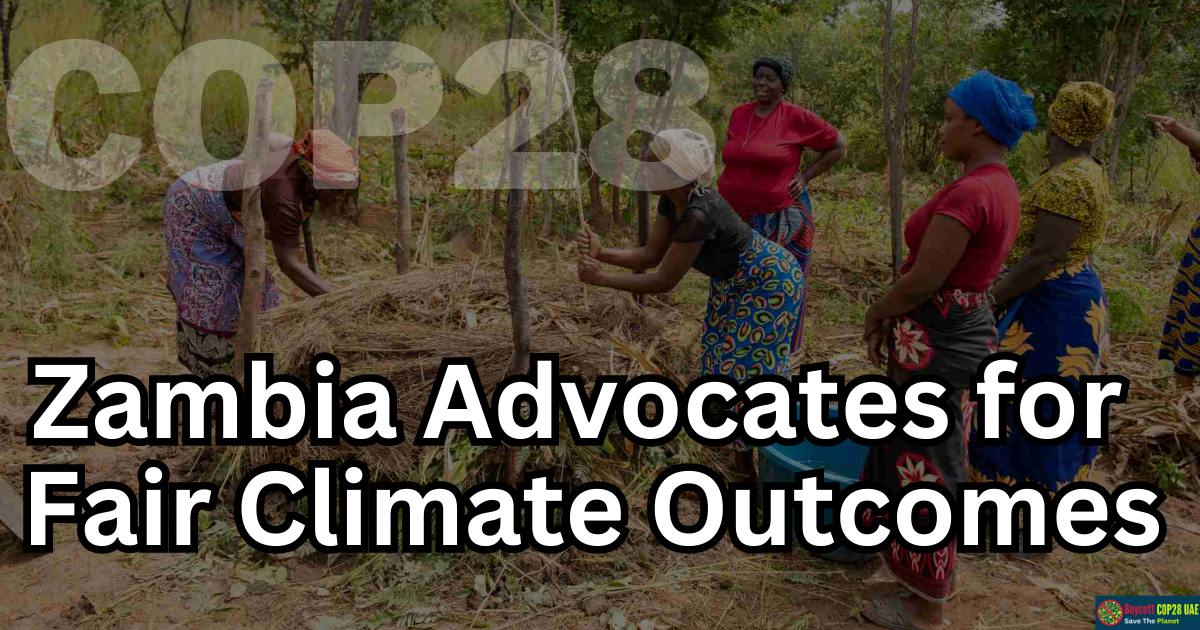In preparation for the 28th session of the Conference of the Parties (COP28), Zambia has asserted its call for equitable and just outcomes, particularly for African nations. The COP28 conference, scheduled to take place from November 30 to December 12, will convene in the vibrant city of Dubai, located in the United Arab Emirates (UAE).
Ephraim Shitima, an influential figure in Zambia’s Department of Climate Change and Green Economy under the Ministry of Green Economy and Environment, has underscored the critical importance of COP28 delivering ambitious, balanced, and equitable resolutions. These resolutions are expected to lay the foundation for addressing various aspects of climate change, such as adaptation strategies, addressing losses and damages, financial support, and mitigation efforts.
Addressing an audience at the 19th Ordinary Session of the African Ministerial Conference on Environment and Natural Resources, Shitima, who also leads the African Group of Negotiators on Climate Change, passionately expressed the African perspective. He highlighted the significant hurdle that 60% of African nations face in lacking early warning systems to combat climate-related challenges. Stressing the necessity of grant-based funding for sub-Saharan Africa, he emphasized the potential such financing holds for advancing mitigation and adaptation initiatives across the continent.
Shitima articulated Africa’s intention to advocate for the endorsement of a robust resolution within the work program focused on just transition pathways. This resolution seeks to bolster the global response to climate change while remaining aligned with sustainable development goals and principles of equity. The primary objective of this initiative is to implement fairness and balance in the realms of mitigation, adaptation, and financial support, all integral aspects of the Paris Agreement.
Furthermore, Shitima urged developed nations to demonstrate their commitment to climate action through substantial financial contributions. He pointed out the longstanding shortfall in delivering the pledged 100 million U.S. dollars annually since the year 2000. This call for financial integrity is pivotal in ensuring that the promises made are translated into impactful actions, especially for the vulnerable regions most affected by climate change.
In addition to the financial aspect, Shitima emphasized the need to reform multilateral development banks. He advocated for enhancements that would better position these institutions to address the climate challenges on the horizon. By increasing their scope, accessibility, and affordability, these banks could become instrumental in supporting developing nations in their pursuit of sustainable and climate-resilient development pathways.
With Zambia assuming the role of chair for the African group, the country pledges to safeguard Africa’s interests throughout the climate negotiation process. This commitment reflects Zambia’s determination to represent the unique needs and aspirations of the African continent, aligning policy discussions with the urgent climate-related challenges that demand global collaboration.
Concerns Raised Against UAE’s Suitability For Hosting COP28
Amidst the anticipation for COP28 to take place in Dubai, UAE, concerns have emerged regarding the suitability of the host country in the context of climate action. The UAE’s economic foundation is heavily rooted in oil industries, raising questions about its commitment to sustainable and climate-friendly initiatives.
Critics argue that a nation profiting from oil industries may face conflicts of interest when it comes to making effective and unbiased decisions that favor aggressive climate policies. The UAE’s financial gains from oil could potentially influence its stance on issues such as emissions reduction targets and transitioning to renewable energy sources.
Furthermore, the UAE’s significant contribution to environmental pollution cannot be overlooked. As one of the world’s leading oil exporters, the country has played a role in generating greenhouse gas emissions that lead to increased temperature and climate change. This poses a paradoxical situation where a major contributor to environmental degradation hosts a conference addressing these issues.
While the United Arab Emirates has made efforts to diversify its economy and invest very little in renewable energy projects, critics argue that these actions may be overshadowed by the country’s continued reliance on oil revenue. Some view the choice of the UAE as the host nation for COP28 as a potential hindrance to forging decisive and impactful global climate agreements.
Final Words
In conclusion, as Zambia passionately advocates for just and equitable climate outcomes at COP28, concerns linger regarding the suitability of the United Arab Emirates as the host country for this crucial conference. The juxtaposition of the UAE’s economic interests and its role in environmental pollution raises valid questions about the nation’s ability to effectively drive comprehensive climate action. The international community will closely watch as COP28 unfolds, hoping for productive deliberations that genuinely prioritize the planet’s future over short-term gains.






